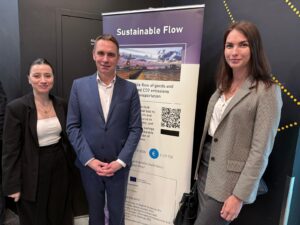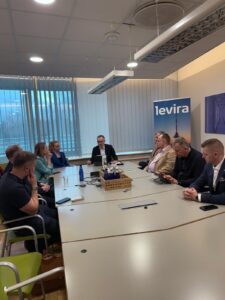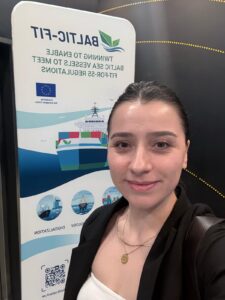On March 20, 2025, the Maritime Cluster Strategy Day 2025 took place at the Tallinn TV Tower, bringing together over 40 stakeholders from the maritime sector to discuss the future of innovation, collaboration, and growth within the industry. Seçil Gülmez, Eliise Toomeoja, Roomet Leiger, and Tõnis Hunt from the Maritime Transport Research Group participated, contributing insights on maritime safety and innovation.
The seminar featured a series of insightful presentations:
- Rainis Vares from Exponaut provided a practical demonstration and consultation on their software solutions.
- Priit Kallakas, Director General of the Economic Diplomacy Department at the Ministry of Foreign Affairs of Estonia, delivered the opening remarks.
- Captain Heikki Koivisto from Satakunta University of Applied Sciences also introduced the Sustainable Flow project.
- Jüri Kirss Jr. of PRINCEPS SOLUTIONS discussed emerging innovators and the importance of collaboration.
- Silver Pütsep from Top Marine shared insights from his journey as an “Entrepreneur of the Year.”
- Merit Kindsigo, Vice-Chair of the Estonian Maritime Cluster, highlighted the power of consortium-based innovation.
- Heigo Mõlder of MindChip spoke on funding opportunities for new ideas.
- Andrus Lillo offered insights on competition and intellectual property.
Sustainable flow and BALTIC-FIT contributed to the event through active participation in parallel workshops, where experts from the project facilitated discussions on how digitalization and sustainability can shape the future of maritime logistics. The workshops included:
- Group 1: Retrofit Hub – led by Raido Lember & Alex Vainokivi, focusing on vessel retrofit strategies.
- Group 2: Ports as Energy Centers – moderated by Rene Pärt & Andriana Chupova, with Eliise Toomeoja, discussing energy transition at port facilities.
- Group 3: Digitalization in Shipping & Logistics – hosted by Peeter Ojasaar & Riina Palu, with Seçil Gülmez, exploring digital innovation in maritime logistics.
The workshops highlighted the importance of collaboration and strategic planning, with a focus on the Maritime Cluster’s export strategies and cooperation models for greater success.
The day ended with a summary of key takeaways and an outlook on next steps, further strengthening the role of research and collaboration in shaping the future of sustainable and digital maritime operations in the region.
This participation reflects a successful cooperation between the BALTIC-FIT project and the Estonian Maritime Cluster and can be seen as a practical workshop for experience exchange, where researchers were engaged as key stakeholders in shaping maritime innovation.




